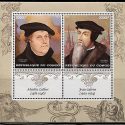Author: Fred Sanders
-
Anthropology Class for LATC18
In mid-January of 2018, Fuller Theological Seminary is hosting the sixth annual Los Angeles Theology Conference. The topic is theological anthropology: The Christian Doctrine of Humanity. As usual, I’m offering a class at Biola’s Talbot School of Theology in conjunction with LATC. The two-day conference itself provides a big chunk of contact hours to build…
-
Invisible Mission of the Trinity
The Father sent the Son to save sinners. The main thing that should make us think of is, of course, the incarnation, in which the Son of God took human nature into personal union with himself and lived out divine sonship in the stuff of earth: as Jesus Christ, born of Mary, entangled in social…
-
Luther Contra Judaeos on the Last Words of David
I’m teaching a class session on Martin Luther’s amazing treatise “On the Last Words of David,” which is Luther’s most satisfying exposition of Trinitarian interpretation of the Bible. It really is a handbook of principles on how to interpret Scripture in Trinitarian fashion: how to find the Trinity in the Old Testament, how to understand the…
-
3 Favorite Robert Jenson Moments
Theologian Robert W. Jenson died this week, after a very productive life of writing theology. His contributions to the field are numerous and wide-ranging, and yet his life-work had a remarkable coherence and focus. There’s an identifiable set of Jenson proposals out there to be dealt with by serious theologians. As he himself said, “it…
-
Rereading Ephesians
I’m teaching Ephesians this semester at the Los Angeles Bible Training School, which I continue to call the best Bible Institute in Los Angeles. Well over a half century of urban ministry centered on the Bible, and the courses are free. Whenever possible in any context, I teach the Bible using the immersion method, roughly…
-
Karl Barth’s Ephesians Lectures
Way back in 1921, Karl Barth taught a course on Ephesians. The lectures from that course have finally been published in English, and while they have some of the defects that are to be expected from a lecture script that the author never revised for publication, they do not disappoint. This short book records a…
-
The Other Barth
It’s possible I’m the only systematic theologian in the world who was a big fan of Markus Barth before I even knew Karl Barth existed. True story, and it’s because of Ephesians. I got saved in high school and then went to a state university to study drawing. I was more or less on my…
-
Let’s Proceed, I Reckon
The title caught my eye: “Processions, Human and Divine.” I am very (very!) interested in divine processions: the eternal generation of the Son and the procession of the Holy Spirit. Knowledge of these two processions is knowledge of the Trinity. But what are these “human processions?” My interest piqued, I grabbed the January 1951 issue…
-

Readings in Luther and Calvin
October 2017 marks the 500th anniversary of the Reformation’s symbolic beginning: Luther’s posting of his 95 theses on the door of the Wittenberg castle church. To celebrate, three Torrey theologians are co-teaching an upper-division elective seminar on the Reformation. Matt Jenson, Greg Peters and I have gathered a group of students and we will spend…
-
Trinity and Atonement Essay
Adam Johnson’s T&T Clark Companion to Atonement has just dropped like the hundred-plus chapter, hundred-plus dollar behemoth that it is. More on that later. For now I’m just posting an excerpt from the chapter I wrote for it, entitled “These Three Atone: Trinity and Atonement.” It’s the first chapter in the volume after the editor’s…
-
Save Us, Sententious Johnson
One of the amazing things about Samuel Johnson’s writing style is his ability to reduce any idea to an aphorism, a fresh little proverb that arises perfectly from the situation in front of him but reaches up to the heaven of abstraction. Just about any page of Johnson will serve to illustrate this Johnsonian quality.…
-
Theology of La Grande Ligne (Boulanger and System)
What I love in theology is the big picture, the long lines of continuity. Whenever I read, I’m always looking for the unifying perspective that arises when a theologian finds an angle from which to behold the overarching unity that lets all the details settle into place. What I dread most in theology (second only…